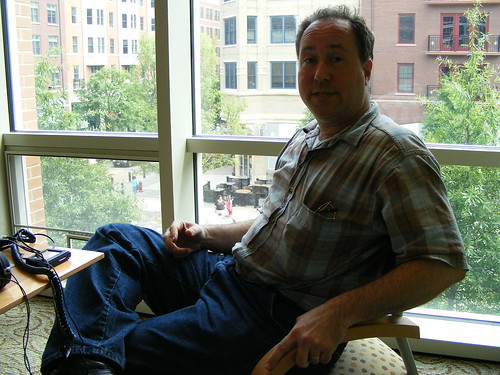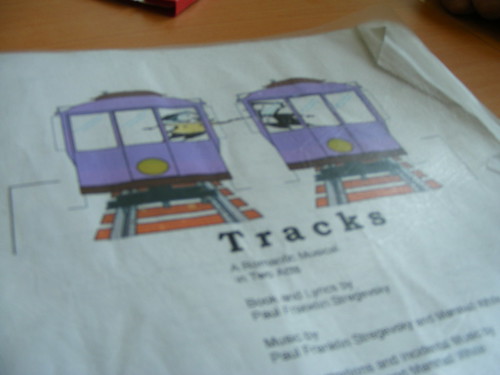part THREE of a series on writer Paul Stregevsky, currently working on a musical about the Purple Line. Check out part ONE | part TWO | part FOUR
 Paul Stregevsky, writer of a musical about the Purple Line, in the Rockville Library.
Paul Stregevsky, writer of a musical about the Purple Line, in the Rockville Library.
Stregevsky chose to set the musical "six to eight miles east" of the Purple Line's planned terminus in New Carrollton, he says, seeing the diversity of his cast in the people of Prince George's County. "You're looking at the face of America in twenty years," he says. "I want whites to look around to see that they'll be just another minority."
Most of the musical is set on the platform of an imagined station in Prince George's County, at the end of a Purple Line spur that receives one train in the morning and one in the evening. If enough riders aren't attracted to the service, it'll be shut down, forcing those who already use it to draw others in. "No one talks when they're waiting for a train . . . it's like peeing at the men's urinal," says Stregevsky. "I had to find a reason for them to be so friendly, so they had to be friendly so they'd attract riders.”
 The cover of Tracks, the musical being written by Stregevsky, Marshall White and Jared Denhard.
The cover of Tracks, the musical being written by Stregevsky, Marshall White and Jared Denhard.
Stregevsky's attempts to get funding or even a read-through of the musical were often unsuccessful. He pitched his project to the Prince George's County cultural affairs office, promising that Tracks "will make your county the most desirable place to live in America," but they refused to look at it.
The American Public Transit Association, a lobbying group, were unmoved by his claims that the musical made mass transportation "cool to ride," while gay rights groups didn't respond to his request that they make sure that Pierre, the musical's one gay character, was represented fairly. "What is with people?" he laments.
He did, however, get a response from Purple Line Now!, a new advocacy group for the transitway. Two days after telling them of his "ambitious, multi-cultural musical about people riding the Purple Line," PLN offered him funding if he gave them a pitch.
With a shot at getting the money he needed to start writing, Stregevsky teamed up with music teacher Marshall White and Baltimore composer Jared Denhard to write a few songs. He emphasizes the "great working arrangement" he has with his collaborators. "There are no prima donnas here. We always put the musical first," he says. "[White] saved my ass so many times . . . I'll go to his house with a tune and he'd say 'this tune sounds familiar.'"
Students at Bethesda-Chevy Chase High School, where White teaches, were cast as actors for a brief pitch for the Action Committee for Transit and Purple Line Now!, both transit advocacy groups, which decided to throw money at Stregevsky's production. But it came with strings: they wanted him to locate the play at the Bethesda station, on the other end of the Purple Line. Doing so would defeat its purpose, he laments. "You're not going to build this family" at a station that already exists, says Stregevsky.
They also demanded that the musical be shortened to an eight-song concert. Stregevsky contends that a longer product would be a much better one, noting that the last twenty-five Tony-winning musicals all had over twenty songs each. "Their goal wasn't 'Let's have a full-blown book musical,' it was 'Let's build the purple line'," says Stregevsky. "It's what everyone wants: a love story. There are five love threads throughout this story."
Willing to compromise, ACT pledged a $10,000 grant for Tracks, the first half of which was delivered in the spring of 2007. Noting how good the B-CC student actors were, the trio of Stregevsky, White and Denhard and the two transit groups agreed to stage Tracks at a local high school the following year. "The kids had so much spirit and spunk and it'd be out there and we'd bring in legislators and get the press," says Stregevsky. The goal was to have the musical co-produced at B-CC and at Suitland High School in Prince George's County, eight miles from the end of the line in New Carrollton. A Suitland production would bring together the two counties the Purple Line would serve - and with its predominantly-black student body, it would help Stregevsky fill roles in his diverse cast.
"There weren't enough people of color at B-CC," says Stregevsky. "They were telling me we weren't going to have a black guy playing the lead."
By January 2008, the first half of the grant money had been spent and the first ten songs were completed, with Stregevsky and a handful of other singers providing the vocals. But the project, including the high school productions, would stop indefinitely when ACT informed the creators of Tracks that the second half of their grant - promised for 2008 - had fallen through.
 Paul Stregevsky, writer of a musical about the Purple Line, in the Rockville Library.
Paul Stregevsky, writer of a musical about the Purple Line, in the Rockville Library."They were telling me we weren't going to have a black guy playing the lead."The Purple Line didn't become a part of the story until Stregevsky read about in 2005, but it made sense to set the musical on an unbuilt line. "All the other lines are already there, they already have the ridership," says Stregevsky. "Imagine the narrative credibility . . imagine needing to get the riders."
Stregevsky chose to set the musical "six to eight miles east" of the Purple Line's planned terminus in New Carrollton, he says, seeing the diversity of his cast in the people of Prince George's County. "You're looking at the face of America in twenty years," he says. "I want whites to look around to see that they'll be just another minority."
Most of the musical is set on the platform of an imagined station in Prince George's County, at the end of a Purple Line spur that receives one train in the morning and one in the evening. If enough riders aren't attracted to the service, it'll be shut down, forcing those who already use it to draw others in. "No one talks when they're waiting for a train . . . it's like peeing at the men's urinal," says Stregevsky. "I had to find a reason for them to be so friendly, so they had to be friendly so they'd attract riders.”
 The cover of Tracks, the musical being written by Stregevsky, Marshall White and Jared Denhard.
The cover of Tracks, the musical being written by Stregevsky, Marshall White and Jared Denhard.Stregevsky's attempts to get funding or even a read-through of the musical were often unsuccessful. He pitched his project to the Prince George's County cultural affairs office, promising that Tracks "will make your county the most desirable place to live in America," but they refused to look at it.
The American Public Transit Association, a lobbying group, were unmoved by his claims that the musical made mass transportation "cool to ride," while gay rights groups didn't respond to his request that they make sure that Pierre, the musical's one gay character, was represented fairly. "What is with people?" he laments.
He did, however, get a response from Purple Line Now!, a new advocacy group for the transitway. Two days after telling them of his "ambitious, multi-cultural musical about people riding the Purple Line," PLN offered him funding if he gave them a pitch.
With a shot at getting the money he needed to start writing, Stregevsky teamed up with music teacher Marshall White and Baltimore composer Jared Denhard to write a few songs. He emphasizes the "great working arrangement" he has with his collaborators. "There are no prima donnas here. We always put the musical first," he says. "[White] saved my ass so many times . . . I'll go to his house with a tune and he'd say 'this tune sounds familiar.'"
Students at Bethesda-Chevy Chase High School, where White teaches, were cast as actors for a brief pitch for the Action Committee for Transit and Purple Line Now!, both transit advocacy groups, which decided to throw money at Stregevsky's production. But it came with strings: they wanted him to locate the play at the Bethesda station, on the other end of the Purple Line. Doing so would defeat its purpose, he laments. "You're not going to build this family" at a station that already exists, says Stregevsky.
They also demanded that the musical be shortened to an eight-song concert. Stregevsky contends that a longer product would be a much better one, noting that the last twenty-five Tony-winning musicals all had over twenty songs each. "Their goal wasn't 'Let's have a full-blown book musical,' it was 'Let's build the purple line'," says Stregevsky. "It's what everyone wants: a love story. There are five love threads throughout this story."
Willing to compromise, ACT pledged a $10,000 grant for Tracks, the first half of which was delivered in the spring of 2007. Noting how good the B-CC student actors were, the trio of Stregevsky, White and Denhard and the two transit groups agreed to stage Tracks at a local high school the following year. "The kids had so much spirit and spunk and it'd be out there and we'd bring in legislators and get the press," says Stregevsky. The goal was to have the musical co-produced at B-CC and at Suitland High School in Prince George's County, eight miles from the end of the line in New Carrollton. A Suitland production would bring together the two counties the Purple Line would serve - and with its predominantly-black student body, it would help Stregevsky fill roles in his diverse cast.
"There weren't enough people of color at B-CC," says Stregevsky. "They were telling me we weren't going to have a black guy playing the lead."
By January 2008, the first half of the grant money had been spent and the first ten songs were completed, with Stregevsky and a handful of other singers providing the vocals. But the project, including the high school productions, would stop indefinitely when ACT informed the creators of Tracks that the second half of their grant - promised for 2008 - had fallen through.

No comments:
Post a Comment